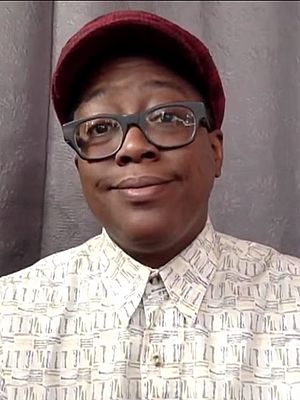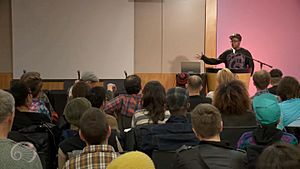Cheryl Dunye facts for kids
Quick facts for kids
Cheryl Dunye
|
|
|---|---|

Dunye in 2016
|
|
| Born | May 13, 1966 |
| Alma mater | Temple University (BA) Rutgers University (MFA) |
| Occupation |
|
| Years active | 1990–present |
| Children | 2 |
| Awards | 1995: Media Production Award; National Endowment for the Arts etc |
Cheryl Dunye (born May 13, 1966) is a Liberian-American film director, producer, writer, and actress. Her work often explores themes of race, identity, and gender. She is famous for telling stories about Black women whose experiences are not often seen in movies.
Dunye is best known for her 1996 film The Watermelon Woman. With this movie, she became the first openly gay Black woman to direct a feature-length film. She runs a production company called Jingletown Films in Oakland, California.
Contents
Early Life and Education
Cheryl Dunye was born in Monrovia, Liberia, and grew up in Philadelphia, Pennsylvania. She first went to Michigan State University to study political theory because she wanted to help change the world.
Soon, she realized that movies and media could be powerful tools for change. She transferred to the filmmaking program at Temple University in Philadelphia. She earned a Bachelor of Arts degree from Temple and later a Master of Fine Arts degree from Rutgers University.
Career in Film and Television
Dunye has had a long career making films and teaching. She has taught filmmaking at many universities, including UCLA and San Francisco State University.
Early Short Films
Dunye started her career by making six short films. These films are known for mixing real-life documentary styles with fictional stories. She calls this unique style "Dunyementaries." In these early works, she often starred as the main character and explored topics like identity, family, and relationships.
Some of her early short films include:
- Janine (1990): An experimental film about her friendship with a high school classmate and feeling like an outsider.
- She Don't Fade (1991): A film that takes a look at the life of a young Black woman.
- Vanilla ... (1992): A short film that explores how the same term can have different meanings to different groups of people.
- Greetings from Africa (1994): A humorous short film where Dunye plays a character trying to understand the dating world.
The Watermelon Woman (1996)

Dunye's first feature film was The Watermelon Woman. The movie is a landmark in film history because it was the first feature film directed by an openly gay Black woman about characters like herself.
The idea for the film came when Dunye was studying Black film history. She noticed that many Black actresses in early movies were not given credit for their work. Frustrated by this, she decided to create a fictional actress, Fae Richards, to tell the story of these forgotten women.
What is the movie about?
In the film, a character named Cheryl, played by Dunye herself, is a filmmaker. She becomes fascinated with a Black actress from a 1930s movie who is only credited as "The Watermelon Woman." Cheryl decides to make a documentary about this mysterious actress.
Her search shows how difficult it is to find information about Black women in Hollywood's history. The film mixes this fictional story with a documentary style, making it feel very real.
Lasting Impact
The Watermelon Woman won awards at film festivals around the world, including the Teddy Award at the Berlin International Film Festival. It was praised for its creative storytelling and for bringing attention to stories that had been ignored.
In 2016, for its 20th anniversary, the film was restored and is now part of the permanent collection at the Museum of Modern Art in New York City. It is still studied in film and history classes today.
Stranger Inside (2001)
Dunye's second feature film was Stranger Inside, a TV movie produced by HBO. The film tells the story of a young woman named Treasure who gets transferred to an adult prison to connect with her mother, who is also an inmate there.
Dunye was inspired to make the film after the birth of her daughter and by the writings of Angela Davis and Harriet Jacobs. She did a lot of research to understand life inside women's prisons. She even held a screenwriting workshop with twelve incarcerated women to help develop the story. This made the film feel authentic and powerful.
Later Work
Dunye has directed many other films and television episodes. In 2004, she directed the comedy My Baby's Daddy. In 2010, she directed The Owls, a thriller about a group of older, wiser friends. Her 2014 short film, Black Is Blue, tells the story of a Black transgender man and was shown at over 35 film festivals.
In recent years, Dunye has become a successful television director. She was invited by director Ava DuVernay to direct episodes of the TV show Queen Sugar. This helped open doors for her in television. Since then, she has directed episodes for many popular shows, including:
- Claws
- Dear White People
- Lovecraft Country
- Bridgerton
- The Umbrella Academy
Personal Life
Dunye is openly gay and has two children. She lives in Oakland, California, where she runs her production company, Jingletown Films. The company's goal is to support filmmakers of color and from the LGBTQ+ community, helping them share their unique stories with the world.
Filmography
As Director (Selected Films)
- Janine (1990)
- She Don't Fade (1991)
- The Watermelon Woman (1996)
- Stranger Inside (2001)
- My Baby's Daddy (2004)
- The Owls (2010)
- Mommy is Coming (2012)
- Black Is Blue (2014)
As Director (Selected Television)
- Queen Sugar (2017–19)
- The Fosters (2018)
- Dear White People (2019)
- Lovecraft Country (2020)
- Bridgerton (2022)
- The Umbrella Academy (2022)
- Dead Boy Detectives (2024)
See also
 In Spanish: Cheryl Dunye para niños
In Spanish: Cheryl Dunye para niños
- List of female film and television directors
- List of lesbian filmmakers
- List of LGBT films directed by women
 | Bayard Rustin |
 | Jeannette Carter |
 | Jeremiah A. Brown |

